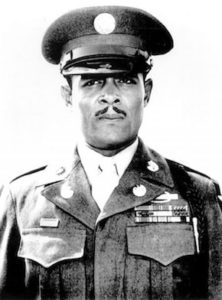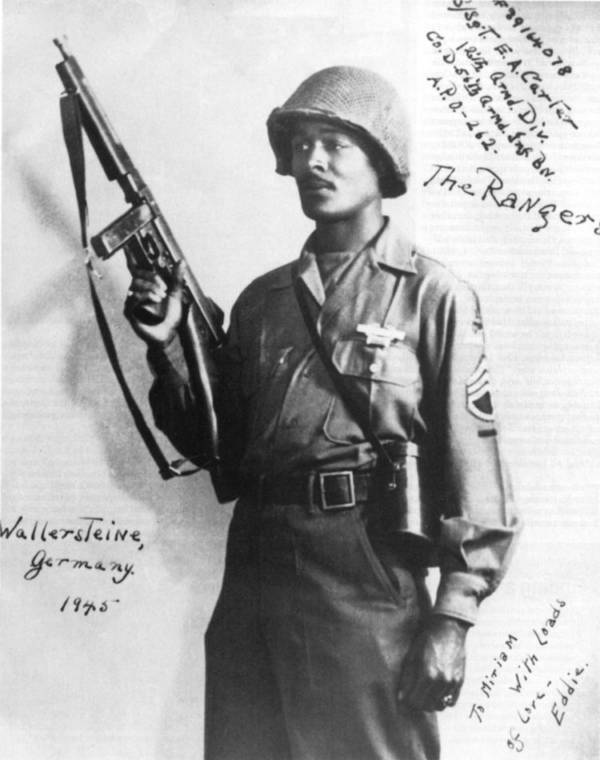Edward A. Carter Jr. was a career non-commissioned officer for the United States Army and one of the few African American recipients of the Medal of Honor during World War II.
Carter was born May 26, 1916, in Los Angeles, California to missionary parents and was raised in Calcutta, India, and Shanghai, China. Fluent in Hindi, Mandarin, English, and German, Carter ran away from home and enlisted in the Chinese Nationalist Army at the age of fifteen to fight the Japanese after the Shanghai Incident of 1932. He rose to the rank of lieutenant before he was found to be underage and discharged.
After a stint in a Shanghai military school and a failed attempt at joining the U.S. Army, Carter wound up in Europe in the late 1930s, fighting for the Loyalists in the Spanish Civil War. He fought as a corporal in the Abraham Lincoln Brigade, an integrated volunteer troop of mostly American socialists until they were forced to flee to Paris in 1938.
Upon his return to the United States, Carter joined the Army in 1941 and was quickly promoted to staff sergeant because of his extensive military experience. Having witnessed the violence and discrimination visited upon African American soldiers during training in segregated Georgia, many of whom were dishonorably discharged when they fought back, Carter was determined to remain in the Army. After he accepted a demotion to cook in an era when blacks were rarely allowed to be officers or even participate in combat, Carter was shipped to Europe in 1944. By 1945, replacements were desperately needed, and Carter once again gave up his staff sergeant stripes. He joined as a volunteer private in the Seventh Army Provisional Infantry Company No. 1 and was assigned to the 56th Armored Infantry Battalion of the 12th Armored Division. Company commander Captain Floyd Vanderhoff, noting Carter’s experience and leadership, restored his staff sergeant stripes and made him an infantry squad leader.
While fighting with the 12th Armored, Carter became a member of General George S. Patton’s “Mystery Division” in his push into Germany and served as Patton’s personal bodyguard. Carter’s actions in battle on March 23, 1945, earned him a recommendation for the Medal of Honor, but because of his race he was awarded instead the Distinguished Service Cross.
After the war, Carter was promoted to sergeant first class and stationed in Fort Lewis, Washington, following a brief break in Los Angeles with his wife Mildred, children Edward and William, and two stepchildren. However, when Carter’s enlistment was near expiration, he was stunned to find that his request for re-enlistment had been denied. Unbeknownst to him, his service with the Lincoln Brigade and experience in China had raised fears of communist ties and made him a target throughout his career. He received an honorable discharge in October 1949.
Carter lived out the remainder of his life as a family man, working in the vehicle tire business. He passed away from lung cancer in Los Angeles on January 30, 1963. He was forty-six.
In 1992 Secretary of the Army John Shannon commissioned an independent study to identify unrecognized African American heroes from World War II. In May 1996, the study was completed and Carter was identified and recommended for honors. On January 13, 1997, President Clinton presented Carter’s posthumous Medal of Honor to his son, Edward Allen Carter III. However, it was not until 1999, after Carter’s family pressed the Army for answers into his disbarment, that the army formally apologized and issued a new discharge certificate, backdated to 1949, indicating that Carter had been eligible for full re-enlistment.

